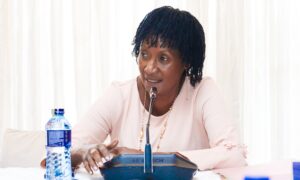In a shocking revelation that has sent ripples through the political and social spheres, Susan Nekesa has come forward with allegations against the former Independent Electoral and Boundaries Commission (IEBC) chairman, Wafula Chebukati. Nekesa’s accusations, made public in a widely circulated Facebook post, detail a tumultuous relationship marked by deception and betrayal.
Nekesa’s account, shared on her social media platform, details her encounter with Chebukati in 2020—a period that initially appeared idyllic, filled with promises of love and commitment. The relationship soon bore fruit in the form of a son, Eugene Wanyonyi, cementing what seemed like a promising future. However, beneath the surface, Nekesa claims, Chebukati harbored a sinister secret.
In her online exposé, Nekesa alleges that Chebukati transmitted HIV, a devastating disease, to her. The gravity of this accusation has reverberated throughout the public discourse, shedding light on a hidden aspect of Chebukati’s personal life. Nekesa’s words, stark and unyielding, pull back the curtain on a relationship that has left her grappling with profound consequences.
The narrative unfurls with Nekesa’s visceral declaration: “Yes, you read that right. Wafula Chebukati, the man who was supposed to be my partner for life, gave me HIV.” Her statement underscores a profound breach of trust, as she describes grappling with the aftermath of this life-altering revelation.
Adding to the gravity of her claims, Nekesa paints a portrait of a man who, despite providing for her medical needs, has retreated into silence—a silence that compounds the emotional and psychological toll she has endured. Nekesa asserts that Chebukati’s recent hospitalization has left her in the dark about his health status, exacerbating her sense of abandonment.
With courage and conviction, Nekesa asserts her right to justice, eschewing sympathy in favor of accountability. She vows, “I’m not here for sympathy, I’m here for justice.” Her words encapsulate a quest for closure and transparency, transcending personal anguish to confront systemic issues of accountability and responsibility.
Nekesa’s public disclosure challenges perceptions of Chebukati, peeling back the veneer of respectability to reveal a “deceitful, selfish man.” Her resolve to seek redress underscores a broader imperative for transparency in public figures, demanding accountability for actions that transcend personal boundaries.
As Nekesa’s narrative continues to resonate across social media platforms, it underscores the power of individual voices in challenging entrenched power structures. Her bravery in sharing her story is a testament to the importance of accountability and transparency in public life.
In response to these grave allegations, Wafula Chebukati’s camp has yet to issue a formal statement. The silence surrounding these accusations amplifies the urgency of addressing the complexities of personal integrity and public responsibility.
Nekesa’s revelations serve as a sobering reminder of the multifaceted challenges individuals face in navigating relationships fraught with deceit and betrayal. Beyond the personal realm, her story invites a broader conversation about the ethical responsibilities of public figures and the imperative of upholding integrity in public office.
In the wake of Nekesa’s disclosures, the public awaits developments that may shed light on the veracity of her claims and the broader implications for ethical conduct in public service. The unfolding saga serves as a cautionary tale and a call to action, highlighting the need for transparency and accountability in both personal and public spheres.



















